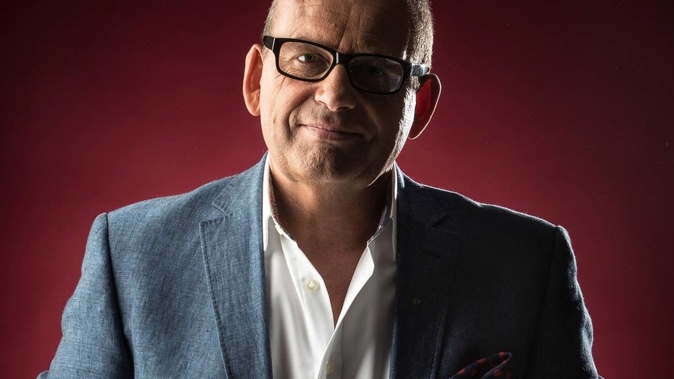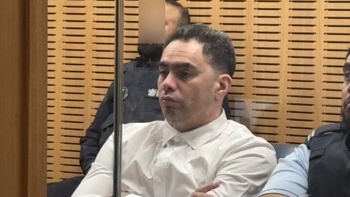
Thirteen years after getting sacked from TVNZ for “crossing the line” in his role as Breakfast host, controversial broadcaster Paul Henry says he wouldn’t change a thing.
Henry, who is now “a retiree making and consuming gin” reflected on his broadcasting career, and the string of controversies that followed him, in a wide-ranging long-form interview on the Between Two Beers podcast.
Henry was one of New Zealand’s most prolific broadcasters across the 2000s with roles hosting Breakfast, The Paul Henry Show, This is Your Life and Close Up.
In 2010 Henry was forced — though officially he chose — to resign from TVNZ, following a global furore involving Indian politician Sheila Dikshit. In a segment on Breakfast, one of New Zealand’s most-watched shows, Henry laughed at her name, calling her “the dipshit woman” and suggesting that “because she’s Indian… she’d be dick-in-s***”.
The saga resulted in New Zealand’s high commissioner calling India to apologise.
“Some absolute t***, working for foreign affairs in India, apologised,” Henry told Between Two Beers. “And I know this for a fact; when they apologised, no one knew what they were talking about. So this apology, which was not solicited and they didn’t know anything about it, was offered without authorisation from New Zealand by this foreign affairs person in India — and all of a sudden it becomes an incident.
“The funny thing is I received quite a few emails, through TVNZ, from students of Sheila Dikshit, who said she actively laughed about her own name. She was a Minister of the Crown in India, but also a lecturer at university. And she credited her success in life, to her surname which people laughed about.
“I could not do now, the sort of jobs I’ve done in the past because New Zealand has become so prissy and so specific. I hate the term woke, but there’s an element of truth to it. I just wouldn’t bow down to that now. I’m just a bloke and I’m just calling it as I see it.”
Henry also made national headlines in 2009 when he commented that a female guest had a moustache.
“I was led to believe she was upset about it,” Henry said. “Of course I’d never intended to upset anyone, so yes, I’m sorry someone was upset by it, but am I sorry for actually doing it? You can’t be sorry for doing it in hindsight. Because you didn’t have all that information upfront.
- Paul Henry returning to TV screens for pandemic news show
- Paul Henry talks Trump v Biden, his new book on the USA
- Lizzie Marvelly pulls out of Paul Henry panel in protest
“In exactly that situation again, would I have done it ... yes. Yes I would. You can avoid saying anything that may vaguely upset anyone, but then what you’re doing is avoiding saying anything at all — and you’re just becoming another script reader.
“People bring [these incidents] up all the time. But I guess they’re the highlights — some people would say the lowlights — but they’re the highlights of the career because they were hugely publicised.”
Henry revealed the extent of the backlash he faced after being sacked by TVNZ for questioning if Governor-General Anand Satyanand was a “real New Zealander”.
“My sacking, I was the biggest racist in this country. That’s was how my sacking was framed. And I literally had to go and hide out. There were journalists staking out my mother’s rest home, in case I went there. Staking out my girlfriend’s house, literally camped in my driveway. That’s how big of a racist I was, that my private life required that much scrutiny ... but it’s part of the rich tapestry.
“I’m not a racist, but I’m not interested in saying that. There is nothing that’s happened to me that makes me even remotely interested in trying to prove that I’m not.”
Henry had been a radio broadcaster since the 1980s, but it wasn’t until 2004 that he started to become a household name. On the Breakfast couch he linked up with Alison Mau, then Kay Gregory, and most famously a young Pippa Wetzell, and during his seven-year tenure the show developed both a committed and growing fanbase, with ratings surging year-on-year.
“There’s a couple of things I did, where better judgment would say, don’t do... but I wasn’t pre-judging what I did, I was just doing it. People will talk about the famous things I allegedly did wrong, and the controversies and they will ignore the fact that I was doing three hours of live television a day, five days a week, for seven years. If you’re going to have a conversation with your partner three times a week for five years, you’re going to say some things you probably shouldn’t have.”
The broadcaster now splits his time between New Zealand, where he has just released a new line of gin called The Henry, and Palm Springs in the United States, where he enjoys being part of a nudist community.
The 90-minute interview also covers his journey from poverty in Bristol to mansions and millions in New Zealand, the time he was captured and beaten as a war correspondent in Iraq, getting fooled by Guy Williams on live TV, his interview methods and his plans for the rest of his life.
Show notes | Episode 111 | Paul Henry
1:52: Between Two Beers (with The Henry Gin)
7:40: Landing Paul Henry on the podcast: a story via Sudan and Osama bin Laden
17:37: “A rich tapestry of life”
21:05: Sodomy in Malaysia and being detained in Iraq
35:27: Life as a foreign correspondent
42:10: Jesus Boots and growing up in poverty
47:55: Lessons from mum and dad
55:59: The journey to becoming the biggest broadcaster in New Zealand
1:02:28: Reflections on breakfast television
1:08:09: Pushing the boundaries: the controversies of Paul Henry
1:17:18: Commercial whaling with Guy Williams
1:19:27: Life after broadcasting
1:22:43: Palm Springs, nudism and perineum sunning
1:26:42: What next for Paul Henry?
1:33:00: Interviews and the three-question method
1:36:08: Last words from Steve, Seamus and Paul
Between Two Beers is part of the Alternative Commentary Collective - NZ’s Home for Sports Entertainment. Check out more podcasts, events, details on live commentaries and sports watch alongs here.
Take your Radio, Podcasts and Music with you









